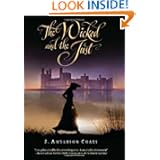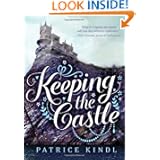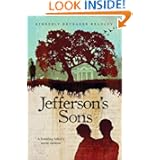What I've Read This Week . . .
The Wicked and the Just by J. Anderson Coats -- Young Adult Historical Fiction
In 1293 Cecile is tired of living with her father, uncle, aunt and teasing cousins in Coventry. She longs to return home to her family's estate Edgeley. Then her father announces that he and Cecily are moving to Caernarvon in Wales where Papa can become a Burgess and not owe military service to the king. He sees this as a great opportunity with the ability to own his own estate as opposed to being steward to his brother at Edgely. Cecily thinks her father is ruining her life. Life inside the walls of Caernarvon isn't physically much different from England but socially they are worlds apart. The Welsh boys stare at Cecily, the servants are lazy and insolent and the Burgesses and their women look down on Cecily and her father. Cecily is determined to keep her head held high in accordance with her role as chatelaine. She faces opposition from her surly servant Gwinny and vows to serve justice to the wicked. Gwenhwyfar was once the daughter of a Welsh land owner. Then her father marched off with the rebels against the English which resulted in his execution and his land being taken away. Her Mam is sick and her brother struggles to find work while her sweetheart continually petitions the king for the rights he deserves as a Welshman. Times are tough and Gwenhwyfar struggles just to survive. She's determined to keep her dignity in spite of all the abuse from the English and most especially the brat she must work for. When a famine and sickness bring an all time low to the Anglo-Welsh relations, the characters face a new and different world. They must find their places and learn to adapt to the new world that is coming. At first this novel is funny and reads a lot like a Karen Cushman book. Then the plot takes a dark and difficult turn towards the end and the story is filled with violence and bloodshed. Medieval period is very gritty and coarse to begin with. I vastly prefer the more genteel nineteenth century but those who like the period will love the details in this novel. Though the writing style sounds very modern, the author infuses slang into the dialogue to make it sound period. The history behind the story seems well-researched and is wonderfully described. There's an excellent historical note at the end that explains the background of the time period and what's happening around the characters. The problem with this novel is the main characters. Neither of them are very likeable. Cecily is amusing at first but she's a typical teen and a spoiled brat. She's rude and wicked and doesn't learn her lessons until it's too late. The story alternates from Gwenhwyfar's point of view but she isn't very likeable either. She's tough. She's had to be tough but she holds a lot of hatred and anger in her heart and doesn't want to let go. Both girls are mostly unsympathetic towards each other. Teens who are interested in the Medieval period would probably like this novel. I'm not certain adults would enjoy it because of the bratty teenage protagonist.
Keeping the Castle by Patrice Kindl -- Young Adult Regency Romance
Althea Crawford's great-grandfather built a folly castle on the edge of a cliff and left little money to keep it from falling into the sea. Now Althea, her widowed mother and small brother must survive the best they can in the crumbling castle. Althea's two horrid step-sisters have a small fortune of their own but only bother to open the purse strings when it is to their own advantage. Althea knows what she must do. She must marry and marry well. There's very little opportunity to meet eligible gentlemen on the Yorkshire moors and Althea has a tendency to speak her mind and gentlemen do not appreciate that. Then the new, young Lord Boring comes to take up his estate bringing a party of young people with him. Lord Boring is friendly and kind and shows an interest in Althea. Lord Boring's cousin and estate manager, Mr. Fredericks, occasionally joins the other young people in society. He's absentminded, rude and bumbling and Althea is constantly scolding him for his manners. Althea hopes her beauty is enough to attract and eligible suitor but is that really enough for her? Would she be happy married to a rich man no matter who he is? Maybe deep down inside, Althea would like to include love in her happily ever after. This cute story is like an introduction to Jane Austen for tween and young teen girls who are not quite ready for the language and nuances of the classic novels. There are many amusing moments in the story, especially the names of the characters. Jane Austen and Georgette Heyer fans will recognize the plot elements but there are some twists and turns that kept me guessing plus an interesting subplot that I think could yield a spin-off. Althea may not be to everyone's taste. She seems mercenary, at least at first, but she is a woman of her time and she doesn't have much choice. The step-sisters are stereotypical two-dimensional characters. Lord Boring is Mr. Bingley. Mr. Fredericks is also a difficult character to like. He has his moments of kindness but he's mostly very brusque and annoying. Althea's attitude towards him resembles that of another outspoken heroine and a rude hero we all know and love. I highly recommend this book to girls 11+ or adult newcomers to the genre. It's a great basic primer that introduces the reader to Regency Society.
Jefferson's Sons by Kimberly Brubaker Bradley -- Middle Grades Historical Fiction
Beverly Hemings knows he's a slave but doesn't really understand the realities of slavery because he and his siblings have always known love and kindness from their mother and benevolence from their master, Thomas Jefferson. One day Bev's mother Sally reveals that Master Jefferson is their father and one day the children will be free and white. Beverly is confused by the knowledge and torn in his feelings. He wants to stay with his mother at the home he loves but longs in his heart to be free. Madison, the middle brother, is worried that his family will go away and leave him because he's too dark to pass. He doesn't understand Beverly's reluctance and desires knowledge and freedom. Little Eston, a musical prodigy, is content with his life. Above all else, they long for their father's love and savor each scrap of attention he gives them. As the children grow older, they learn to ask difficult questions: what does it mean to be a slave? Who decides who is a slave? What does it mean to be black? What makes one white? What do the words in the Declaration of Independence really mean? Did Jefferson achieve what he set out to do? Does the fact that Jefferson owns slaves and enslaves his children make him less of a great man? As Jefferson ages, the slaves of Monticello wonder what will happen to them when Master Jefferson dies? This excellently researched book tells the true story of Thomas Jefferson's secret children from the points of view of Beverly, Madison and another enslaved child at Monticello. There isn't much plot. It all leads up to the Hemings' twenty-first birthdays when they will gain their freedom and to Jefferson's death. I've studied Sally Hemings, slavery and been to Monticello so I already knew the facts. I found it difficult to finish the book because I already knew what happened to the characters since they are all real people. I liked getting to know the boys, as I already feel I know Harriet from Ann Rinaldi's novel Wolf by the Ears. I liked reading their inner turmoil and how they felt about being the unacknowledged children of such a famous man and how they dealt with the family resemblance. I did find the questions raised in the novel interesting but very heavy for the age group. Historians and scholars are constantly debating. I think this book is designed to be read in the classroom. There's an author's note and extensive bibliography. I would recommend this to elementary school and middle school History teachers and their students but not for a child to read on their own.
The Wicked and the Just by J. Anderson Coats -- Young Adult Historical Fiction
In 1293 Cecile is tired of living with her father, uncle, aunt and teasing cousins in Coventry. She longs to return home to her family's estate Edgeley. Then her father announces that he and Cecily are moving to Caernarvon in Wales where Papa can become a Burgess and not owe military service to the king. He sees this as a great opportunity with the ability to own his own estate as opposed to being steward to his brother at Edgely. Cecily thinks her father is ruining her life. Life inside the walls of Caernarvon isn't physically much different from England but socially they are worlds apart. The Welsh boys stare at Cecily, the servants are lazy and insolent and the Burgesses and their women look down on Cecily and her father. Cecily is determined to keep her head held high in accordance with her role as chatelaine. She faces opposition from her surly servant Gwinny and vows to serve justice to the wicked. Gwenhwyfar was once the daughter of a Welsh land owner. Then her father marched off with the rebels against the English which resulted in his execution and his land being taken away. Her Mam is sick and her brother struggles to find work while her sweetheart continually petitions the king for the rights he deserves as a Welshman. Times are tough and Gwenhwyfar struggles just to survive. She's determined to keep her dignity in spite of all the abuse from the English and most especially the brat she must work for. When a famine and sickness bring an all time low to the Anglo-Welsh relations, the characters face a new and different world. They must find their places and learn to adapt to the new world that is coming. At first this novel is funny and reads a lot like a Karen Cushman book. Then the plot takes a dark and difficult turn towards the end and the story is filled with violence and bloodshed. Medieval period is very gritty and coarse to begin with. I vastly prefer the more genteel nineteenth century but those who like the period will love the details in this novel. Though the writing style sounds very modern, the author infuses slang into the dialogue to make it sound period. The history behind the story seems well-researched and is wonderfully described. There's an excellent historical note at the end that explains the background of the time period and what's happening around the characters. The problem with this novel is the main characters. Neither of them are very likeable. Cecily is amusing at first but she's a typical teen and a spoiled brat. She's rude and wicked and doesn't learn her lessons until it's too late. The story alternates from Gwenhwyfar's point of view but she isn't very likeable either. She's tough. She's had to be tough but she holds a lot of hatred and anger in her heart and doesn't want to let go. Both girls are mostly unsympathetic towards each other. Teens who are interested in the Medieval period would probably like this novel. I'm not certain adults would enjoy it because of the bratty teenage protagonist.
Keeping the Castle by Patrice Kindl -- Young Adult Regency Romance
Althea Crawford's great-grandfather built a folly castle on the edge of a cliff and left little money to keep it from falling into the sea. Now Althea, her widowed mother and small brother must survive the best they can in the crumbling castle. Althea's two horrid step-sisters have a small fortune of their own but only bother to open the purse strings when it is to their own advantage. Althea knows what she must do. She must marry and marry well. There's very little opportunity to meet eligible gentlemen on the Yorkshire moors and Althea has a tendency to speak her mind and gentlemen do not appreciate that. Then the new, young Lord Boring comes to take up his estate bringing a party of young people with him. Lord Boring is friendly and kind and shows an interest in Althea. Lord Boring's cousin and estate manager, Mr. Fredericks, occasionally joins the other young people in society. He's absentminded, rude and bumbling and Althea is constantly scolding him for his manners. Althea hopes her beauty is enough to attract and eligible suitor but is that really enough for her? Would she be happy married to a rich man no matter who he is? Maybe deep down inside, Althea would like to include love in her happily ever after. This cute story is like an introduction to Jane Austen for tween and young teen girls who are not quite ready for the language and nuances of the classic novels. There are many amusing moments in the story, especially the names of the characters. Jane Austen and Georgette Heyer fans will recognize the plot elements but there are some twists and turns that kept me guessing plus an interesting subplot that I think could yield a spin-off. Althea may not be to everyone's taste. She seems mercenary, at least at first, but she is a woman of her time and she doesn't have much choice. The step-sisters are stereotypical two-dimensional characters. Lord Boring is Mr. Bingley. Mr. Fredericks is also a difficult character to like. He has his moments of kindness but he's mostly very brusque and annoying. Althea's attitude towards him resembles that of another outspoken heroine and a rude hero we all know and love. I highly recommend this book to girls 11+ or adult newcomers to the genre. It's a great basic primer that introduces the reader to Regency Society.
Jefferson's Sons by Kimberly Brubaker Bradley -- Middle Grades Historical Fiction
Beverly Hemings knows he's a slave but doesn't really understand the realities of slavery because he and his siblings have always known love and kindness from their mother and benevolence from their master, Thomas Jefferson. One day Bev's mother Sally reveals that Master Jefferson is their father and one day the children will be free and white. Beverly is confused by the knowledge and torn in his feelings. He wants to stay with his mother at the home he loves but longs in his heart to be free. Madison, the middle brother, is worried that his family will go away and leave him because he's too dark to pass. He doesn't understand Beverly's reluctance and desires knowledge and freedom. Little Eston, a musical prodigy, is content with his life. Above all else, they long for their father's love and savor each scrap of attention he gives them. As the children grow older, they learn to ask difficult questions: what does it mean to be a slave? Who decides who is a slave? What does it mean to be black? What makes one white? What do the words in the Declaration of Independence really mean? Did Jefferson achieve what he set out to do? Does the fact that Jefferson owns slaves and enslaves his children make him less of a great man? As Jefferson ages, the slaves of Monticello wonder what will happen to them when Master Jefferson dies? This excellently researched book tells the true story of Thomas Jefferson's secret children from the points of view of Beverly, Madison and another enslaved child at Monticello. There isn't much plot. It all leads up to the Hemings' twenty-first birthdays when they will gain their freedom and to Jefferson's death. I've studied Sally Hemings, slavery and been to Monticello so I already knew the facts. I found it difficult to finish the book because I already knew what happened to the characters since they are all real people. I liked getting to know the boys, as I already feel I know Harriet from Ann Rinaldi's novel Wolf by the Ears. I liked reading their inner turmoil and how they felt about being the unacknowledged children of such a famous man and how they dealt with the family resemblance. I did find the questions raised in the novel interesting but very heavy for the age group. Historians and scholars are constantly debating. I think this book is designed to be read in the classroom. There's an author's note and extensive bibliography. I would recommend this to elementary school and middle school History teachers and their students but not for a child to read on their own.




No comments:
Post a Comment
Leave comments and or suggestions for QNPoohBear, the modern bluestocking.